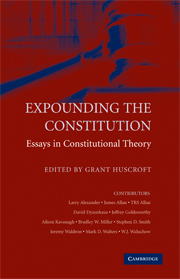Book contents
- Frontmatter
- Contents
- Preface
- Contributors
- Introduction
- PART I MORALITY AND THE ENTERPRISE OF INTERPRETATION
- PART II JUDICIAL REVIEW, LEGITIMACY, AND JUSTIFICATION
- PART III WRITTEN AND UNWRITTEN CONSTITUTIONAL PRINCIPLES
- 9 Constitutional Justice and the Concept of Law
- 10 Written Constitutions and Unwritten Constitutionalism
- 11 Unwritten Constitutional Principles
- Index
9 - Constitutional Justice and the Concept of Law
Published online by Cambridge University Press: 25 July 2009
- Frontmatter
- Contents
- Preface
- Contributors
- Introduction
- PART I MORALITY AND THE ENTERPRISE OF INTERPRETATION
- PART II JUDICIAL REVIEW, LEGITIMACY, AND JUSTIFICATION
- PART III WRITTEN AND UNWRITTEN CONSTITUTIONAL PRINCIPLES
- 9 Constitutional Justice and the Concept of Law
- 10 Written Constitutions and Unwritten Constitutionalism
- 11 Unwritten Constitutional Principles
- Index
Summary
There are certain vital principles in our free Republican governments, which will determine and overrule an apparent and flagrant abuse of legislative power…. An act of the Legislature (for I cannot call it a law) contrary to the great first principles of the social compact, cannot be considered a rightful exercise of legislative authority.
Calder v. Bull 3 US (3 Dall) 386 at 388 per Chase J. (1798).INTRODUCTION
If we begin our reflections on constitutional jurisprudence from the legal positivist's notion of law – law as whatever is commanded by those who wield established authority – we face great difficulties in accounting for much of our legal experience. Can the familiar associations between law and liberty, or between law and justice, as daily exhibited in the practice of liberal democracy, really be only contingent connections, wholly dependent on the specific wording of a particular constitutional text? And is it true that, in the absence of such a text, all the liberties of the citizen are necessarily at the mercy of the current legislative majority? Are the unwritten principles of liberal constitutionalism, frequently acknowledged by courts as well as jurists, only optimistic presumptions – entirely subservient to the clear instructions of the text, which may or may not sustain them? Why should we try so hard to marry such a notion of “law,” having echoes of a brigade commander's instructions to his troops, with the complex content of a jurisprudence apparently devoted to securing the legitimacy of official coercion?
- Type
- Chapter
- Information
- Expounding the ConstitutionEssays in Constitutional Theory, pp. 219 - 244Publisher: Cambridge University PressPrint publication year: 2008
- 3
- Cited by



